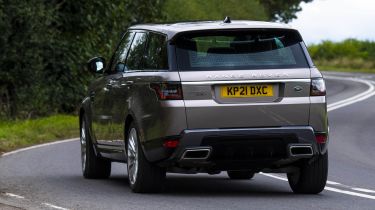Range Rover Sport PHEV (2018-2022) running costs, insurance, warranty & tax
If you can keep the batteries topped up and rarely travel more than 25 miles at once, the Range Rover Sport PHEV makes a lot of financial sense
| Insurance group | Warranty | Service intervals | Annual company-car tax cost (20%/40%) |
|---|---|---|---|
| 49-50 | 3yrs / unlimited miles | 1yr / 16,000 miles | From £2,771 / £5,542 |
Starting from just over £75,000, the Range Rover Sport PHEV is more expensive than the competition from Audi, Mercedes and Porsche, but compared to the Range Rover PHEV – which isn’t much bigger – it starts to look almost like good value.
Likewise, you don’t have to look too far to find rivals like the Volvo XC90 that are more economical than the Sport PHEV, which averages up to 87mpg in official tests. But, thanks to its combination of a 2.0-litre turbocharged petrol engine with an electric motor and a battery pack, this P400e can work out much cheaper to run than other Range Rover Sport models.
The reason we say "can work out…" rather than "will…" is the same as for any plug-in hybrid: the economy you get depends hugely on the kind of driving you do. The PHEV Sport works best if you have a fairly short commute and can top up the batteries frequently. The higher your annual mileage and the more time you spend on motorways, the more likely it is that a diesel Range Rover will make more sense.
Range Rover Sport PHEV insurance group
The plug-in versions of the Range Rover Sport sit in relatively high insurance groups – either group 49 or 50, depending on the trim level – but by the standards of the model, that’s not too bad. After all, most other Range Rover Sport models sit in at least group 45.
Warranty
All Land Rover vehicles, including the Range Rover Sport PHEV, are covered by a three-year/unlimited-mileage warranty. There’s no extra warranty on the hybrid system’s components, but you can buy an extended warranty when the new-car warranty runs out.This will cover the car until it’s 10 years old or has 100,000 miles on the clock, whichever is sooner. Overall, that level of cover is on a par with what you will find on any of the car’s most obvious rivals.
Servicing
Whichever engine you choose in your Sport, the service interval is every 16,000 miles or once a year, whichever comes first. However, it’s worth considering taking out a service plan. For a one-off fee (which you can pay up to 90 days after the date of registration), all scheduled servicing for up to five years and 50,000 miles will be covered – but not any wear-and-tear items.The price of the plan varies, depending on the engine, with the cheapest being the 2.0-litre Ingenium petrol, which costs £750. And, while the PHEV's plan is dearer, at £925, it’s still a good-value package.
Road tax
Most people consider a hybrid not because it’ll save the world, but because it can save them money. That’s true in many ways, but not in terms of road tax. If you want a car that’s exempt from the annual charge, you need something with zero CO2 emissions. As it’s an alternative-fuel car, the Range Rover Sport will cost £145 a year to tax. But because the list price of every model is higher than £40,000, you also have to pay a £335 annual surcharge the first five times you tax it, for a total of £480 a year during that time.
Depreciation
The Range Rover badge is very desirable, even on the used market – and that makes for strong residual values. In fact, the Sport is predicted to hold on to an even higher proportion of its value than the larger Range Rover, which is impressive enough in its own right. After three years and 36,000 miles, the Sport is expected to retain well over half of its value when new.



